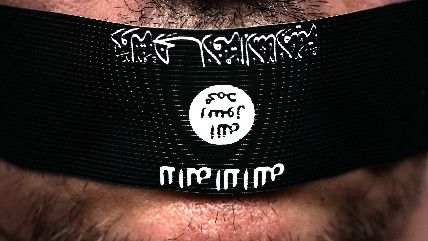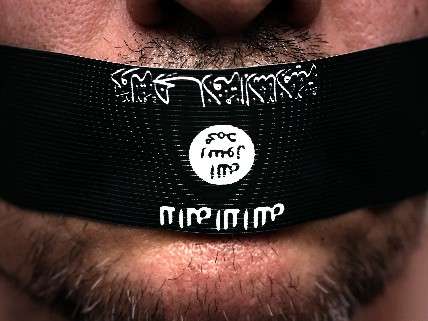The Latest Excuse for Curbing Free Speech? ISIS.
Law professor Eric Posner never misses a chance to scaremonger for limits on free expression.

Eric Posner is making quite the name for himself as one of free speech's most

virulent critics. The University of Chicago law professor appears to have an inexhaustible supply of rationalizations for why free expression must be policed by a benevolent government entity, one that will always share the same values and sensibilities deemed righteous by himself.
In Slate, Posner writes that the "unprecedented threat" of ISIS using the internet to propagandize and recruit "calls for new thinking about limits on freedom of speech." His reasoning for for the abandonment of one of civilization's most sacred values and the enemy of despots and psychotic religious zealots worldwide? A New York Times profile on Ali Amin, a 17 year-old Virginia kid who "exchanged messages with other supporters and members" of ISIS. Though Amin was convicted of providing material support for terrorism, he never committed any acts of violence. He merely just drove an ISIS recruit to the airport and offered advice on how to transfer funds.
It's good that Amin, an active enabler of ISIS, was taken out of circulation. It's even better that we didn't have to shred the Constitution to put him in prison. But that's not enough for Posner, because "Amin did not start out as a jihadi; he was made into one."
The law professor seems to be suggesting that some jihadis are born that way, but if we wanted to be generous and chalk that up to clumsy writing, how would Posner's plan for protecting us from the "unprecedented" threat of people with bad ideas and violent intentions work in practice?
Here's the details:
Consider a law that makes it a crime to access websites that glorify, express support for, or provide encouragement for ISIS or support recruitment by ISIS; to distribute links to those websites or videos, images, or text taken from those websites; or to encourage people to access such websites by supplying them with links or instructions. Such a law would be directed at people like Amin: naïve people, rather than sophisticated terrorists, who are initially driven by curiosity to research ISIS on the Web.
The law would provide graduated penalties. After the first violation, a person would receive a warning letter from the government; subsequent violations would result in fines or prison sentences. The idea would be to get out the word that looking at ISIS-related websites, like looking at websites that display child pornography, is strictly forbidden. As word spread, people like Amin would be discouraged from searching for ISIS-related websites and perhaps be spared radicalization and draconian punishment for more serious terrorism-related crimes.
Posner admits this very polite exercise in thought-policing would not "would not deter sophisticated terrorists who send one another encrypted messages," i.e., the terrorists most likely to kill people, but that "laws directed at this behavior would make a dent in recruitment."
A "dent in recruitment." That's a pretty low return on investment, given what's being sacrificed.
In exactly one sentence, Posner pays lip service to the fact that the US has "overreacted" to perceived threats in the past. Though he never gets into specifics, he refers to the World War I-era crackdown on "dissenters who merely criticized the war and were not spreading German propaganda or trying to recruit agents."
Those dissenters were Socialist Party activists protesting what they believed was a misbegotten and immoral war. Their convictions under the Espionage Act were upheld by the Supreme Court, when Justice Oliver Wendell Holmes famously made his "fire in a crowded theater" analogy regarding free speech, which is still cited as a means of quelling unpopular opinions to this day. When Posner inevitably writes another anti-free speech jeremiad, he might want to clarify whether or not he believes imprisoning non-violent anti-war protesters is an "overreaction" or a justified move by a responsible government during a time of "national emergency."
Not content with handing over the legality of unpopular beliefs to unnamed agents of the state, Posner repackages familiar arguments once used against violent video games that the technological advances in ISIS' propaganda make their videos more seductive and irresistible to "naive" recruits. To drive this point home, Posner revisits the argument he made in the wake of the 2012 attack on the US Embassy in Benghazi, when the Obama administration and illiberal Western liberals made false and tortured arguments that the attack was "sparked" by the no-budget Youtube video Innocence of Muslims.
Then, as now, Posner argues that speech must have "value" to be deserving of protection:
The major justification for freedom of speech is the marketplace of ideas—the claim that if people can say whatever they want, the best ideas will flourish. But just what is it that we can learn from ISIS? The social value of beheading apostates? The finer points of crucifixion? Those who regard free speech as fundamental need to consider whether legal principles that arose centuries ago make sense in the age of Snapchat.
University of Iowa law professor Paul Gowder pours cold water on Posner's unhinged characterization of ISIS as an existential threat to the US by noting that about 7 Americans per year have been killed by terrorism over the past decade (and not all of the terrorists have been Muslims). Just as pertinently, Gowder takes down Posner's suggested law to criminalize websites that "glorify" ISIS:
First, that would be a totally unworkable law even if it weren't for the standard moral, constitutional, and prudential objections to censoring political speech.
Do we really want courts deciding what "glorifies" or "expresses support for" ISIS? Do we want the local Assistant U.S. Attorney choosing who gets prosecuted for this? How about the kind of surveillance it would take to enforce it?—?do you want the federal government watching every website you access?
In a very funny and usefully fact-based blog post, Popehat's Ken White aptly describes Posner as "well-cast as the First Amendment's nemesis: he represents everything it stands against. He represents obeisance to passing tastes about what is couth, clenched fists of power disguised as helping hands, suppression dressed up as order."
White then presents a guide of the anti-free expression villainy personified by Posner, including the professor's support for anti-blasphemy laws which in practice are really just "tools for religious majorities to oppress minorities," tortured arguments in favor of speech codes on college campuses because young adults of legal age "must be protected like children while being prepared to be adults," and true to Posner's unwavering belief in shadowy government forces who could never abuse their authority, a spirited defense of the NSA's mass collection of metadata.
Regarding the speech codes on college campuses so adored by the paternalistic Posner, a student at George Washington University (GWU) was recently ordered by campus police to remove a Palestinian flag from his dorm window after another student complained and an adminstrator told him the flag was not "respectful" of his peers. If the goal is maximum safety, including emotional safety, and such a flag offends someone or conjures images of Hamas suicide bombings, who is Posner to object? Or would he call this an "overreaction?"
Reason TV covered the GWU-Palestinian flag kerfuffle in a video you can watch below:


Show Comments (161)